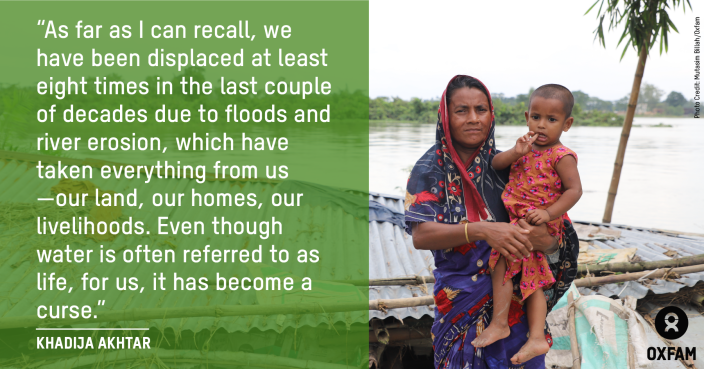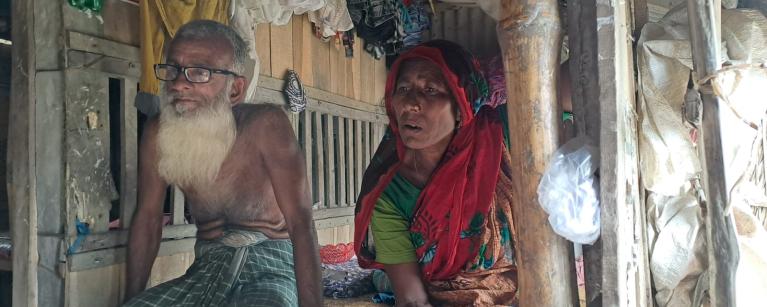The onset of the Asian monsoon season, which has intensified markedly over the past five years, is upon us. As we publish this piece, monsoon rains have already triggered deadly flash floods and landslides in the Cox’s Bazar refugee camps. All of this unfolds while Bangladesh continues to recover from Cyclone Remal, which struck less than a month ago.
Cyclone Remal, the first of the 2024 season, tore through Bangladesh and India in May. Over the course of nearly 50 hours, millions of people endured harsh winds reaching 125km per hour and towering 12-foot tidal surges. While many took to social media to inform about their safety in urban centres, in 20 coastal districts of Bangladesh, 16 lives were lost, and 4.6 million people were affected.
Despite the country’s early warning system saving lives, the damage was extensive. Around 133,528 houses were fully destroyed and 40,338 damaged across the affected districts. Agriculture suffered immensely, with 171,109 hectares of farmland damaged, posing new food security challenges.
Additionally, the fisheries sector experienced significant losses as the cyclone affected 38,083.89 hectares of farms, including those for fish, shrimp, and hatcheries. The culminative financial loss according to the Ministry of Disaster Management and Relief is 595 million USD in 20 districts.
Accounts from the Ground
Md. Rashid, a 60-year-old resident of Barguna District, represents the plight of many. He and his family barely escaped with their lives to a cyclone shelter, leaving everything behind.
"The volunteers were urging us to go to the shelter immediately after the danger signal 10 was declared. We left right away, but when we returned home the next day, there was nothing left," Rashid recounted to Oxfam.
His wife and daughter-in-law, Sharmin (28), sat beside him, tears streaming down their faces. Sharmin added, "A tree had fallen on our house. We've lost our boats and belongings. For the last three days, we've been living in neighbours’ houses. We don't know what we will do now." She stood outside their destroyed home, recalling the last time they had cooked food four days before Cyclone Remal struck.
Cyclone Remal breached embankments along the nearly 800-kilometer coastal belt, affecting 300 locations in the hardest-hit districts. Saline water flooded farmland, fish enclosures, ponds, and crab farms. Damaged water points and sanitation facilities have created severe drinking water shortages.
Locals from the community, like Hasan Ali from Barguna, voiced their frustrations, "If the roads and embankments can be repaired, our households could be saved from waterlogging. Now we can’t cook and are depending on dry foods."
Water-related disasters have forced nearly eight million people out of their homes, separate times, in 10 of the world’s worst-hit countries last year – a 120% increase compared to a decade ago.
Somalia, China, Philippines, Pakistan, Kenya, Ethiopia, India, Brazil, Bangladesh, and Malaysia topped the list of countries that suffered the largest displacement of people from floods and droughts last year, according to the Global Internal Displacement Database. In these countries, the number of times people were displaced from their homes soared from 3.5 million in 2013 to 7.9 million in 2023.

Climate Crisis linked to Inequality
Cyclone Remal, the longest cyclone to hit Bangladesh in the past 1.5 decades, highlights the increasing severity of climate-related disasters and its impact on the poor.
The climate crisis and economic inequality are often considered independently of one another. However, it is not possible to address either of these challenges without engaging with the other: they’re inextricably linked.
The divide between rich and poor is increasing in Bangladesh. The richest 265 Bangladeshi have 27 percent as much more wealth than 85 million Bangladeshis. Globally, the ultra-rich are the biggest individual contributors to the climate crisis. The richest 1% of the world emit as much planet-heating pollution as two-thirds of humanity. While the rich use their resources to safeguard themselves from heatwaves or cyclone, people on the margins lose a greater share of their wealth.
Asgor Kha and Moriom who live in Lebubunia village of Satkhira have lost their homes four times due to cyclones. “We are still in debt for having taken a house loan. Our son is our only earning member, but he struggles to find any work in the area,” they told Oxfam.
Global leaders, after years of advocacy and mounting public pressure, are finally recognizing the need to tax the super-rich. In May this year, a communiqué following the G7 Finance Ministers and Central Bank Governors meeting acknowledged that a significant majority of people, across party lines and countries, support proposals to fairly tax the wealthy. This shift is not to their credit but a result of relentless efforts by numerous stakeholders highlighting the dangers of wealth concentration for our planet and its people.
Who Needs to Pay?
Bangladesh contributes only 0.56% of global carbon emissions but country could lose up to 11 percent of its land, with a projected half-meter sea level rise. By 2051, the government estimates the impacts of climate change could displace one in seven people in the country.
Cox Bazar is the world’s largest refugee settlement, which is home to over 900 000 Rohingya refugees. Changing weather patterns add to the woes of the community.
Shaheena Akter, single-mother, is a daily-paid agricultural worker from Nowapara, a village in Cox’s Bazar, Bangladesh. The long, dry summer months impact her household income and increase the care burden on women and girls in her community.
“‘Because of lack of water, the harvest is low. When the income from the crop is less, I am not paid enough by the landowner. We travel far to bring water to irrigate the land. It takes a lot more time, but I am not paid for the extra hours,” Shaheena Akter said.
“If women don’t bring in enough money from their farming work, they get beaten by their husbands. This is very common in my village. Because families don’t have enough money, girls discontinue their education or are married off early. Early marriage is quite common in my village among farming communities,” she added.
Rich countries agreed to support lower-income countries with funding for climate action in the 2015 Paris Agreement, but most of that funding has been provided as loans, and so far, the lower-income countries need 27 times more funding than they’re receiving.
Last year, at CoP28, the world leaders agreed to a Loss & Damage fund to compensate the affected communities. Now they need to show the money, as well as finding the trillions needed for a just transition away from fossil fuels.
More equal societies are fundamental to stopping climate breakdown as they lay the foundations for governments to be able to take the steps needed to repurpose our economies away from fossil fuels and overconsumption.
Moving Forward
Our humanitarian work post Cyclone Remal aims to reach 100,000 people by restoring WASH facilities, providing livelihood options, repairing shelters, and improving community infrastructure.
The resilience of people is remarkable, but they need global support to rebuild and prepare for an uncertain future. It's a call to action for us all to address climate change and support those who bear its harshest impacts.
